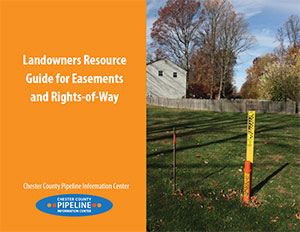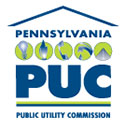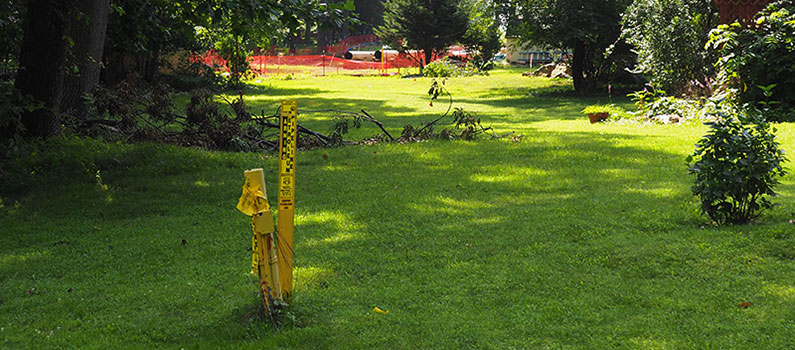The following information is intended to serve as a resource for landowners and residents, including those who may have an existing or proposed pipeline right-of-way on or near their property. Please note that landowners should not rely solely on this information to direct their land or financial decisions. This information is not intended to be, and should not be considered to be, a substitute for legal advice and planning. Any individual who undertakes suggestions presented hereafter, should do so only after consulting with an experienced professional advisor.
Below you will find information on the following:
- Landowners Resource Guide for Pipeline Easements and Rights-of-Way
- Finding Pipeline Locations and Operators
- Finding Pipeline Easements through the Recorder of Deeds
- Website and Publication Resources for Landowners
Landowners Resource Guide for Pipeline Easements and Rights-of-Way
 The resource guide provided here is intended to serve as a resource for landowners and residents, including those who may have an existing or proposed pipeline right-of-way on or near their property. Links and resources on easements are included for those interested in more detailed information on the subject.
The resource guide provided here is intended to serve as a resource for landowners and residents, including those who may have an existing or proposed pipeline right-of-way on or near their property. Links and resources on easements are included for those interested in more detailed information on the subject.
Please note that landowners should not rely solely on this information to direct their land or financial decisions. This information is advisory and not intended to be, and should not be considered to be, a substitute for legal advice and planning. Any individual who undertakes specific suggestions presented in the resource guide should do so only after consulting with an experienced professional advisor. View Guide
Finding Pipeline Locations and Operators
If you are interested in doing background research on a pipeline project, the Chester County Pipeline Information Center can help you locate the operators contact information. The interactive map will allow you to zoom into a specific area of interest, and includes information on the pipeline operators, if any, in that specific area.
- View the interactive pipeline map.
- View pipeline operators.
- View information about active pipeline projects in Chester County.
Finding Pipeline Easements through the Recorder of Deeds
 Residents who believe they already have an easement on their land should not assume that the easement is listed on their deed. Some easements go back 80 years, and may or may not have been recorded at the county courthouse. That being said, you can obtain your deed information, as well as a title report for your property, by contacting the Chester County Recorder of Deeds and providing them with the parcel number you wish to know more about. Visit the Chester County Recorder of Deeds website.
Residents who believe they already have an easement on their land should not assume that the easement is listed on their deed. Some easements go back 80 years, and may or may not have been recorded at the county courthouse. That being said, you can obtain your deed information, as well as a title report for your property, by contacting the Chester County Recorder of Deeds and providing them with the parcel number you wish to know more about. Visit the Chester County Recorder of Deeds website.
Homeowner’s Insurance and Gas Pipeline Projects
After receiving inquiries regarding what impact a gas pipeline passing through a property has on homeowners insurance coverage, Arthur Hall Insurance has developed a Frequently Asked Questions page to answer some of the questions they receive most often. View the FAQ
Website and Publication Resources for Landowners
 The following websites and publications provide guidance for landowners and residents interested in learning more about how pipelines and pipeline easements may impact their property. Information on guidance in the easement negotiation process is also provided through several of these resources.
The following websites and publications provide guidance for landowners and residents interested in learning more about how pipelines and pipeline easements may impact their property. Information on guidance in the easement negotiation process is also provided through several of these resources.
The Chester County Bar Association has a lawyer referral service, where landowners can talk to a lawyer, who is licensed and insured, for an initial 30-minute consultation for $25. They are located at 15 W. Gay Street, 2nd Floor, West Chester, PA 19380. View the lawyer referral service.
Penn State Extension
 The Penn State Extension provides a section on their website that discusses Marcellus Shale and Natural Gas and has different categories including leasing an royalties, municipal government impacts, environmental impacts, and more.
The Penn State Extension provides a section on their website that discusses Marcellus Shale and Natural Gas and has different categories including leasing an royalties, municipal government impacts, environmental impacts, and more.
Pipeline Safety Coalition
 The Pipeline Safety Coalition (PSC) is a non-profit that focuses on improving public, personal, and environmental safety in pipeline issues. PSC provides equal access to information, community mentoring, and facilitating productive communication between all parties involved in pipeline issues. The PSC provides information for landowners and communities, and also provides resources, information on pipeline basics, and pipeline safety education and has developed a Chester County Preparedness & Emergency Response Guidebook.
The Pipeline Safety Coalition (PSC) is a non-profit that focuses on improving public, personal, and environmental safety in pipeline issues. PSC provides equal access to information, community mentoring, and facilitating productive communication between all parties involved in pipeline issues. The PSC provides information for landowners and communities, and also provides resources, information on pipeline basics, and pipeline safety education and has developed a Chester County Preparedness & Emergency Response Guidebook.
Pipeline Safety Trust
The Pipeline Safety Trust, located in Bellingham, Washington, provides a landowner's guide to pipelines, which includes information on how pipelines are operated and regulated, what rights landowners hold, and how to find further information. View the Pipeline Safety Trust's Landowner's Guide to Pipelines.
FERC's An Interstate Natural Gas Facility on my Land? What do I need to Know?
This brochure explains in general terms how the FERC certificate process works, as well as addresses some basic landowner concerns. There is also a page dedicated to the Natural Gas industry which includes general information, landowner topics, natural gas pipelines and more.
Law Offices of Carolyn Elefant
The Law Offices of Carolyn Elefant is a law firm that focuses on FERC energy practice and policy, including federal siting and eminent domain.
Ohio State University Extension, Understanding and Negotiating Pipeline Easements
This fact sheet explains pipeline easements and reviews issues and terms for landowners to consider when negotiating an easement.
American Institute of CPAs, Condemnation of Pipeline Easements: The Landowners Perspective, 2014
This article explores income tax issues that commonly occur in connection with the conveyance of easements, with a focus on pipeline condemnation proceedings and planning issues and opportunities.

PA PUC and the utilities/products they regulate
This page discusses what the jurisdiction of the PA PUC is, and what the state legislature has empowered them to direct and enforce.




